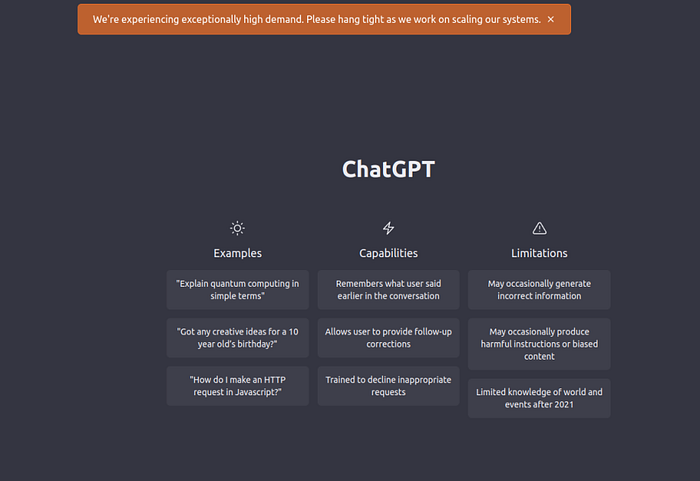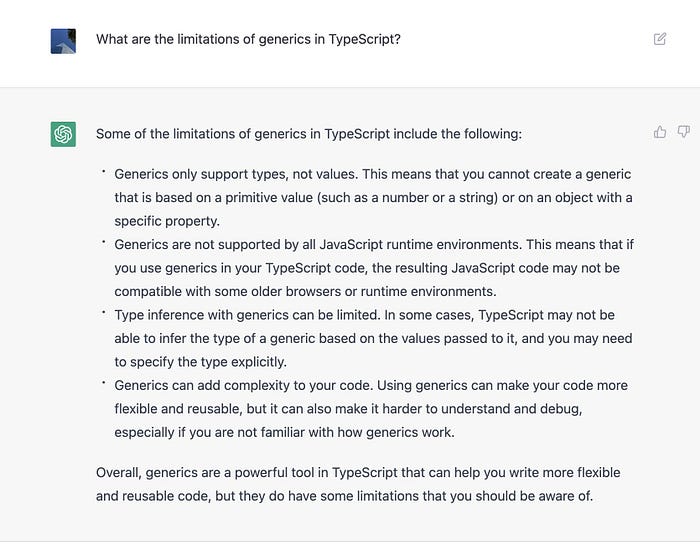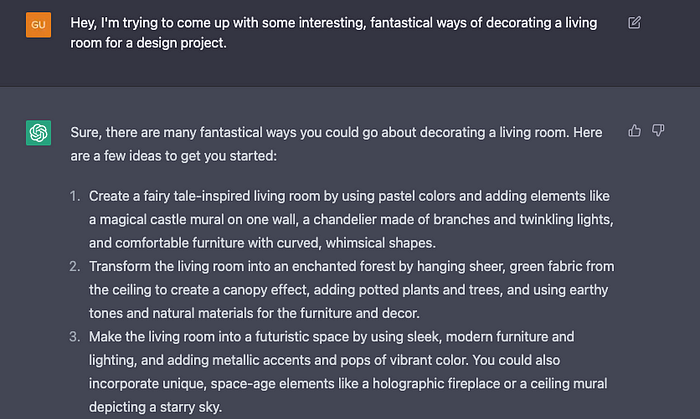Artificial intelligence (AI) refers to the development of computer systems that can perform tasks that typically require human intelligence, such as learning, problem-solving, and decision-making. AI has the potential to revolutionize many industries and has already begun to have a significant impact in fields such as healthcare, finance, and transportation. There are many different tools and technologies used in the development of AI, including machine learning algorithms, natural language processing (NLP) systems, and robotics. These tools allow for the creation of intelligent systems that can analyze and interpret data, generate responses to input, and learn from experience. In this article let’s discuss one such tool which is making headlines on the Internet for the last couple of days — ChatGPT. Let’s learn everything we know so far about this tool in this article.
What is ChatGPT
ChatGPT is a cutting-edge natural language processing (NLP) tool developed by OpenAI. It is a variant of the popular GPT-3 language model, which has been trained on a massive dataset of human conversation and is able to generate human-like responses to text input. One of the key features of ChatGPT is its ability to understand and respond to context. This means that when you have a conversation with ChatGPT, it will remember what was previously said and use that information to generate more relevant and coherent responses. This allows for more natural and fluid conversation and makes ChatGPT a powerful tool for a wide range of applications.
Who Developed ChatGPT?
ChatGPT has been developed by OpenAI, a leading research institute focused on the development of artificial intelligence. OpenAI is known for its work on language processing and other AI technologies and has developed a number of popular tools and models, including GPT-3, on which ChatGPT is based on. OpenAI’s goal is to advance the field of AI and develop technologies that can help improve the world.
Different Applications of ChatGPT
ChatGPT is a versatile natural language processing (NLP) tool that has many potential applications. Some possible applications for ChatGPT include:
- Creative writing: ChatGPT could provide suggestions and prompts to help writers overcome writer’s block and generate ideas.
- Healthcare: ChatGPT could be used to help doctors and nurses by providing them with real-time information about patients, such as their medical history, current symptoms, and potential diagnoses.
- Education: By providing instant feedback and personalized responses, ChatGPT could help improve the learning experience for students.
- Research: It could be used to help researchers generate hypotheses and design experiments by providing them with real-time information and suggestions.
- Customer service: ChatGPT could be used to power chatbots that provide instant responses to customer queries, reducing wait times and improving customer satisfaction.
- Translation: ChatGPT could be used to translate text from one language to another, providing instant and accurate translations.
- Storytelling: ChatGPT could help create engaging and immersive stories by suggesting dialogue and plot twists based on input from the user.
- Personal assistants: ChatGPT could be used to power virtual assistants that can help with tasks such as scheduling, sending reminders, and providing information. These are just a few examples of the many potential applications for ChatGPT. As NLP technology continues to advance, it is likely that ChatGPT and other similar tools will be used in a wide range of industries and contexts.
How to get access to ChatGPT?
Right now ChatGPT is in the research phase and is free to use. You can visit this link, log in to your OpenAI account and you can start using it.
Sometimes you might see this screen because of the high load they’re getting. But you should be able to use it after waiting for some time.

ChatGPT high demand error screenshot
Examples of ChatGPT-Generated Content
Over the last couple of days, everyone is freaking out about the results of ChatGPT. Here are some examples:
- ChatGPT Finds Bugs in a Piece of Code and Explains It

ChatGPT finding a bug in a code
2. ChatGPT Returning Better Results Than Google

ChatGPT returning limitations of generics in TypeScript
3. ChatGPT Helps With Different Ways of Decorating a Living Room for a Design Project

ChatGPT showing ways of decorating a living room
4. ChatGPT Explains a Complex Regex Without Any Context

ChatGPT explains a complex regex without any context
The internet is full of such examples in the last couple of days. We will find out more about the power of ChatGPT in the coming days and weeks.
Can ChatGPT Replace Human Jobs?
It is possible that ChatGPT or other advanced artificial intelligence systems could be used to perform some tasks that are currently done by humans. However, it is unlikely that ChatGPT or any other AI system will be able to completely replace human workers. AI systems are designed to assist with certain tasks, but they are not capable of replicating the full range of abilities and skills that humans possess. Additionally, the use of AI in the workplace raises a number of ethical and social issues that will need to be addressed.
Can ChatGPT Replace Creative Writers?
While ChatGPT is a powerful tool for generating text, it is not capable of replacing creative writers. While ChatGPT can provide suggestions and prompts to help writers overcome writer’s block and generate ideas, it cannot create original content on its own. The ability to generate creative and original content is a uniquely human skill, and it is unlikely that AI will be able to fully replicate it in the foreseeable future. Additionally, even if ChatGPT were able to generate original content, it would lack the human experience and perspective that is necessary for truly creative writing. Creative writing often reflects the thoughts, feelings, and emotions of the writer, and it is difficult for AI to replicate this level of depth and complexity. Therefore, while ChatGPT can be a valuable tool for writers, it cannot replace them. It can assist with the writing process, but ultimately, it is the human writer who must bring their unique perspective and creativity to the work.
Future Plans for ChatGPT
As with any cutting-edge technology, it is difficult to predict the future plans for ChatGPT with certainty. However, given the impressive capabilities of ChatGPT and its potential for a wide range of applications, it is likely that OpenAI and other organizations will continue to invest in its development and explore new ways to use it. One possible direction for the future development of ChatGPT is to improve its ability to understand and respond to context. As NLP technology continues to advance, ChatGPT and other similar tools will likely become even better at understanding the nuances of human conversation and generating more relevant and coherent responses. Another potential area of focus for ChatGPT is to expand its applications beyond text-based communication. For example, ChatGPT could be used to generate voice responses, allowing for more natural and intuitive interactions with AI. Overall, the future of ChatGPT is promising and exciting. As NLP technology continues to evolve, it is likely that ChatGPT and other similar tools will become even more powerful and widely used in the years to come.
Conclusion
In conclusion, ChatGPT is a cutting-edge natural language processing (NLP) tool that has the potential to revolutionize a wide range of industries. Its ability to understand and respond to context makes it a valuable asset for applications such as customer service, education, and creative writing. As NLP technology continues to advance, ChatGPT and other similar tools will become increasingly important for businesses and individuals alike. While ChatGPT is not capable of fully replacing human writers, it can assist with the writing process and provide valuable insights and suggestions. Overall, ChatGPT is a powerful and versatile tool that has the potential to greatly enhance the way we interact with language.
Comments
Loading comments…